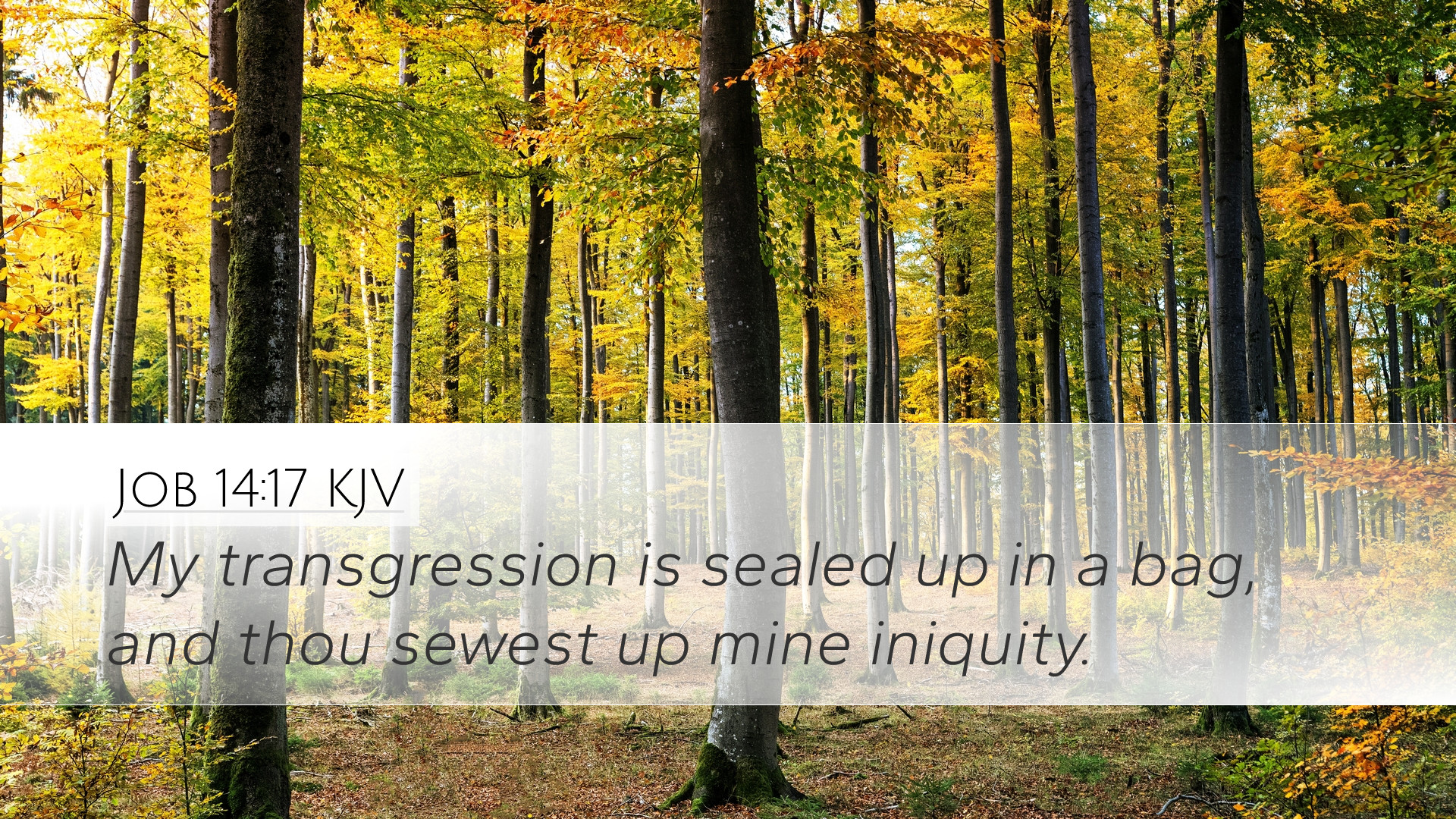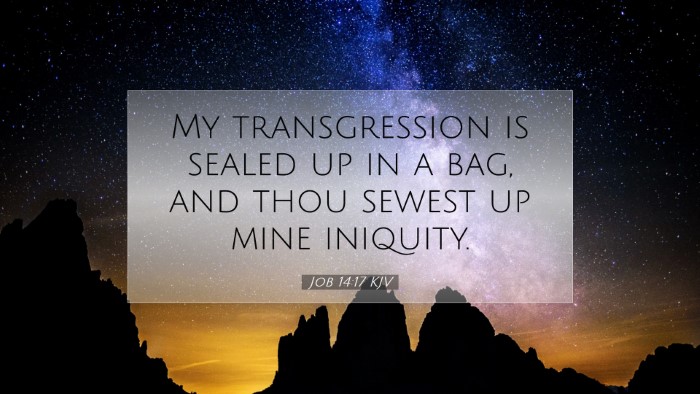Old Testament
Genesis Exodus Leviticus Numbers Deuteronomy Joshua Judges Ruth 1 Samuel 2 Samuel 1 Kings 2 Kings 1 Chronicles 2 Chronicles Ezra Nehemiah Esther Job Psalms Proverbs Ecclesiastes Song of Solomon Isaiah Jeremiah Lamentations Ezekiel Daniel Hosea Joel Amos Obadiah Jonah Micah Nahum Habakkuk Zephaniah Haggai Zechariah MalachiJob 14:17
Job 14:17 KJV
My transgression is sealed up in a bag, and thou sewest up mine iniquity.
Job 14:17 Bible Commentary
Commentary on Job 14:17
Verse Text: "My transgression is sealed up in a bag, and thou sewest up mine iniquity."
Introduction
This poignant verse from the Book of Job highlights the profound struggle of the human spirit in the face of suffering and divine justice. Job’s profound lament speaks to the universal experience of humanity's relationship with sin, suffering, and the hope of redemption. In this commentary, we will draw insights from Matthew Henry, Albert Barnes, and Adam Clarke to provide a contextual understanding of this verse for pastors, students, theologians, and Bible scholars.
Contextual Background
Job, a man described as blameless and upright, endures great suffering, losing his wealth, children, and health. Throughout the dialogues with his friends, Job wrestles with the question of why the righteous suffer. Chapter 14 serves as a contemplative reflection on mortality, the transience of life, and the hope of divine mercy.
Verse Analysis
My Transgression is Sealed Up in a Bag
Matthew Henry: Henry suggests that Job's imagery of sin being "sealed up in a bag" indicates the permanence and weight of sin that oppresses the soul. It suggests that Job feels that his sins are held against him tightly, just as one would seal a bag shut. The contents are secure, emphasizing the inescapable nature of his guilt.
Thou Sewest Up Mine Iniquity
Albert Barnes: Barnes interprets the metaphor of sewing iniquity as God’s method of holding sin accountable. Just as a seamstress secures fabric together, God ensures no sin goes unnoticed. Barnes underlines that this signifies God’s awareness and eventual judgment. It may feel suffocating for Job, who is overwhelmed by the thought that his iniquity is firmly bound and presented against him by God.
Theological Implications
Adam Clarke: Clarke adds that this reflects a broader theological idea concerning the accountability of humanity before God. Believers are often consumed by the weight of their sins, and Job’s plea serves as a reminder of how guilt can manifest in the human experience. Clarke emphasizes the hope that people may find in repentance, framing iniquity not just as condemnation but as an opportunity for spiritual reflection and renewal.
Reflection on Human Suffering
Job's assertion highlights a deeper struggle with existential questions regarding suffering and sin. It suggests that in moments of collective suffering, such as Job's, individuals might feel trapped by their past transgressions.
- Suffering as a Pathway to Understanding Sin: Job connects his physical suffering to his spiritual state, indicating a desire to understand God’s role in his pain.
- The Weight of Guilt: The image of iniquity sealed up resonates with those who struggle under the burden of sin. It invites a theological examination of guilt, forgiveness, and restoration.
- The Nature of Divine Justice: This verse opens the discussion about how justice operates within the character of God. Job's anguish brings forth questions about retribution and mercy.
Conclusion
Job 14:17 provides a profound insight into the human condition. Drawing on the insights provided by Henry, Barnes, and Clarke, we can see that this verse encapsulates the struggle between sin and suffering, the weight of guilt, and the hope for divine justice. For pastors and scholars, this verse is not merely a reflection on personal sin but a compelling invitation to explore the depths of God’s grace in the midst of human suffering. As we reflect upon Job's words, let us be reminded of the need for confession, the value of repentance, and the ever-available mercy that God provides.


